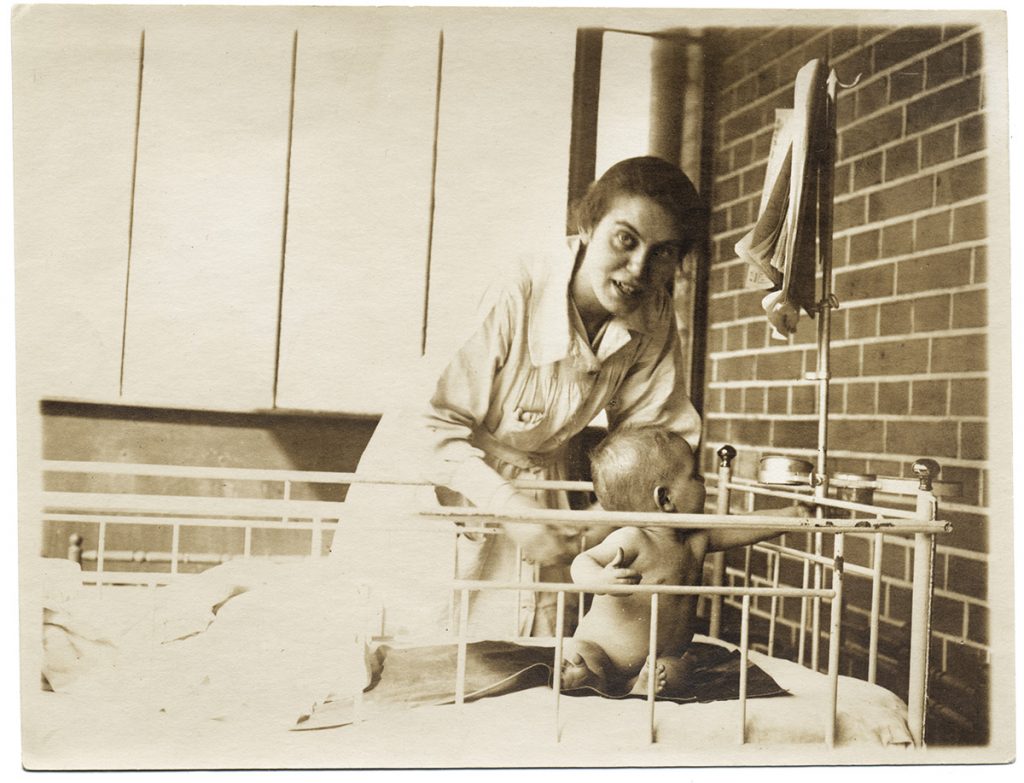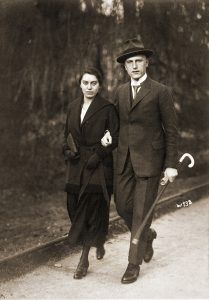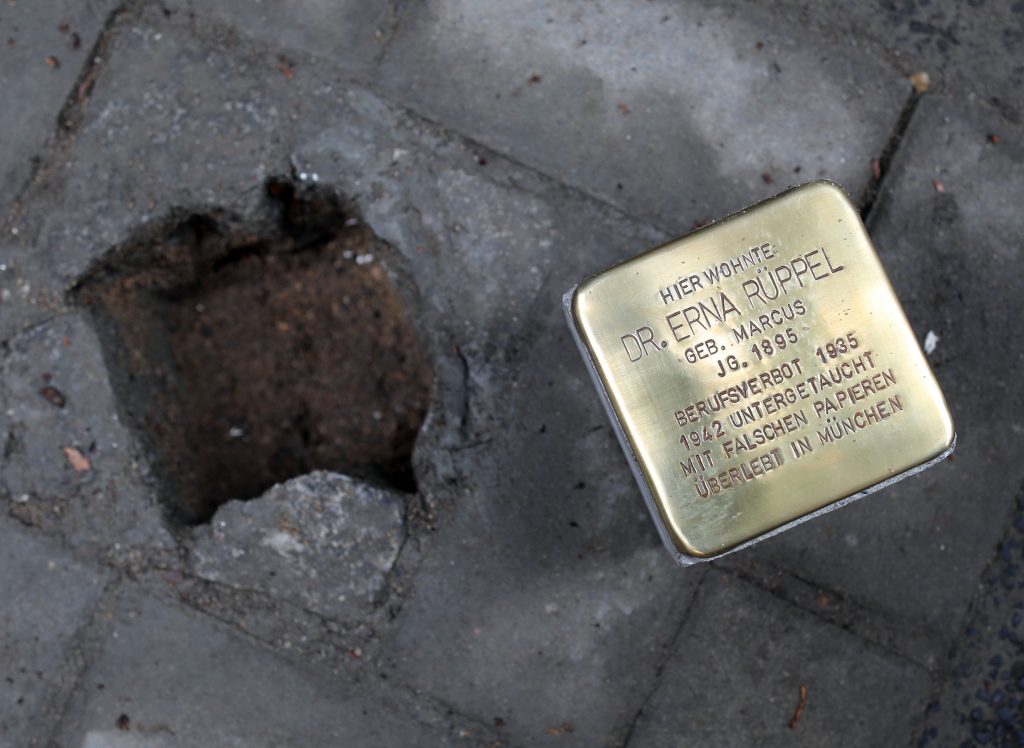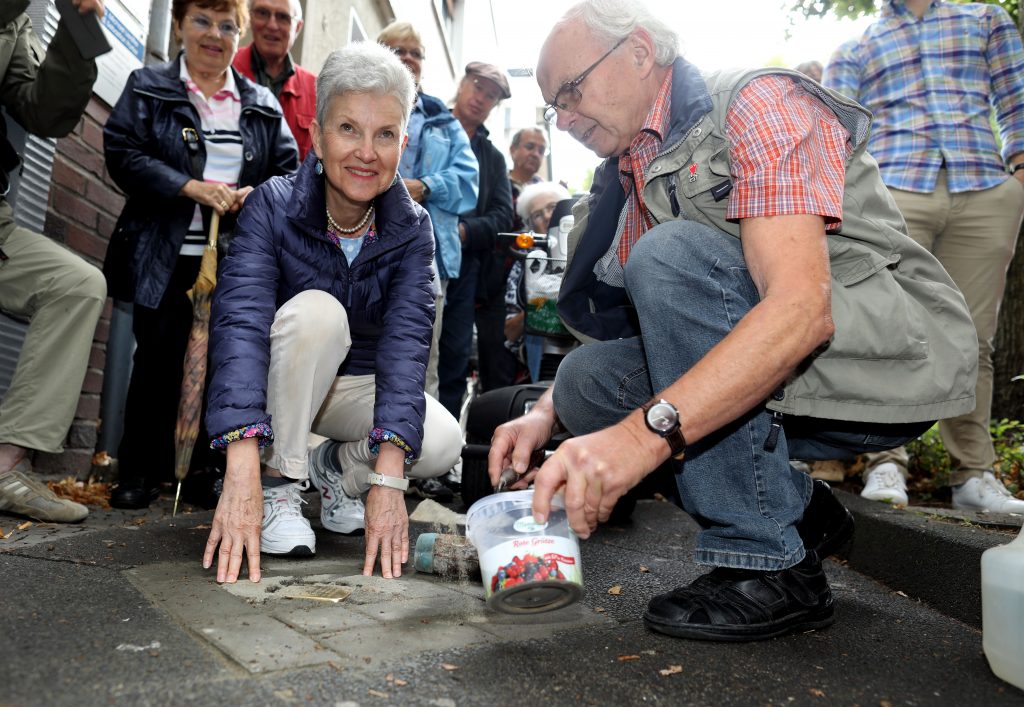Stop 7: Dr. Erna Rüppel
Augustastraße 10 – go to map – go to starting point
Paediatrician Dr. Erna Rüppel of Solingen came, on her mother’s side, from the family of Joseph Feist who played a role in the steel ware industry as well as in the synagogue community. Erna Marcus, as was her maiden name, was born in 1895 in Wuppertal-Barmen. She spent her childhood and youth in Cologne where, in 1913, she successfully completed her “Abitur” (school-leaving qualification comparable to A levels), an absolute rarity at the time. She studied medicine afterwards, mostly at the University of Bonn.
There were more than 4,000 female students at German universities in 1914, accounting for 6% of all students. 11.2% of these female students were Jewish. In the winter semester of 1911/12, 28% of female Jewish students were studying medicine.
It was probably at the university hospital of Bonn that Erna Marcus met her future husband Dr. Hans Rüppel, who had been born illegitimately in 1890 and went on to become an internist. They got married in December 1921. The marriage remained childless.

After several years of gaining practical experience in Herrenalb, where Hans Rüppel was director of the local “Kurhaus” (the central building of a health resort), the couple moved to Solingen in 1927. They settled at Weststraße (today: Klemens-Horn-Straße) 25a and, together with neurologist Dr. Paul Berkenau, they set up a joint medical practice there. Once they had established themselves, they separated their medical practices and Drs. Rüppel moved to Weststraße 32 in 1929. Hans Rüppel sold the “Kurhaus” in 1932 so that he and his wife could finance the construction of their own house, which they started building at Augustastraße 10. In December 1933, they moved into their new home that comprised two medical practices as well as two flats, one for Mr. and Mrs. Rüppel and one for their aunt Hermine Rüppel who ran the household.
The history and spiral of exclusion was the same as for all Jews – the only difference being that, according to racist criteria, Dr. Hans Rüppel was actually “Aryan”. But he was boycotted nonetheless and lost his permission to treat state-insured patients as well as his position as director of the department for internal medicine at the Sanatorium Bethesda. One day after the “Kristallnacht” of 1938, the couple’s flat as well as Hans Rüppel’s medical practice were ransacked. Dentist Dr. Langenohl, a member of the Nazi party NSDAP and medical officer at its paramilitary wing “Sturmabteilung” (SA), was involved in the ravage. The day after, two sons of pastor Johannes Lutze (from the Confessing Church) visited the Schott and the Rüppel families as a sign of solidarity.
As a result of these events, Mr. and Mrs. Rüppel decided to get divorced in pretence. They were hoping that the internist would return to earning his regular wages this way and, consequently, would be in a position to financially support Erna’s elder disabled sister Grete and her mother. Proceedings like that were extremely expedited at the time and the divorce decree was already issued at the end of December that year. A couple of days later, Erna Rüppel moved out.
The “Israelite Asylum for the Sick and Elderly“ in Cologne became her new worksite and residence. Since her approbation had been revoked, she started working there as a student nurse. Gradually, the National Socialists forcefully committed Jews to so-called “Judenhäuser” (“Jew houses”). When they started doing so in Cologne, Erna Rüppel managed to secure a place for her mother and sister in the Israelite asylum’s department for the elderly.
The Thousand-bomber raid on Cologne of 31 May 1942 changed everything. The Israelite Asylum had remained intact but was evacuated nonetheless to make room for “Aryan” patients. The sick and elderly were taken to the Müngersdorf camp from where, starting in June, they were deported to Theresienstadt. Erna Rüppel was assigned to one of these transports. With lots of luck, she managed to jump off the truck and was able to notify a contact address in Solingen. From then on, she lived in illegality, in Solingen at first and, later on, in Düsseldorf. With the help of Croatian friends, Hans Rüppel managed to organise fake identity papers for Erna with which she could assume a false identity and live a life less threatened.
Erna Rüppel started working at the Red Cross Hospital in Munich in June 1943, going by the name of Anna Markus(ch). It took almost another two years until the city was liberated by the US army, a time that must have been extremely burdensome for her. She could never let her guard down, never let her true identity or her medical expertise show. During the last months of the war, she suffered from a painful sialadenitis caused by a salivary stone stuck in the gland. She did not have this surgically treated for she feared that she might accidentally mutter her real name when waking up half-consciously after the operation. The arrival of the Americans was a liberation to her.
Shortly after returning to Solingen, she took a bus to the Czechoslovakian border, hoping to be able to pick up her mother and sister from the Theresienstadt concentration camp. But the Czech government had closed the borders and she went back to Solingen empty-handed. In 1952, she had her mother and sister be declared dead.
Back in Solingen, she started to re-assemble her old life: she re-opened her medical practice, applied for compensation, married her husband for a second time. Mr. and Mrs. Rüppel witnessed the conviction of the SA troop that had ransacked their flat, including aforementioned dentist Dr. Langenohl. The couple was part of several committees that worked towards re-establishing democracy.
In 1952, Hans Rüppel moved in with another woman – he lived in Düsseldorf from then on, but maintained solidarity with Erna Rüppel by not getting divorced from her and by transferring her the desired assets. Erna Rüppel died in 1970. Her burial was attended by an overwhelming number of people as she was laid to rest on the Protestant cemetery at Kasinostraße.
In the presence of relatives from the Feist family, a Stolperstein was laid at Augustastraße 10 in 2018.



